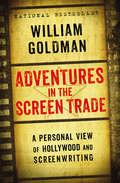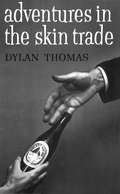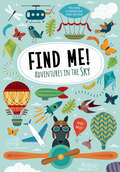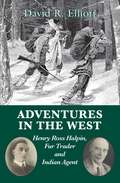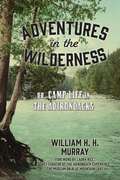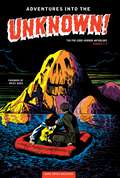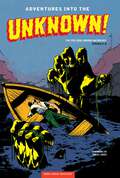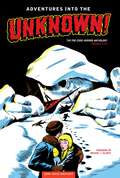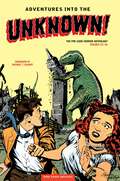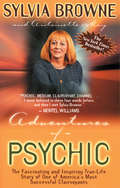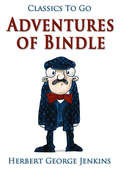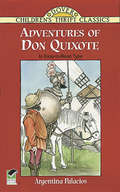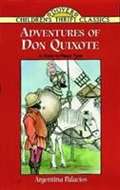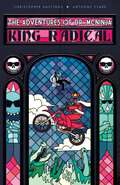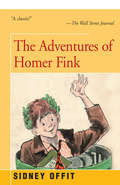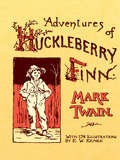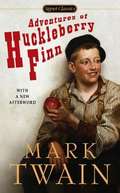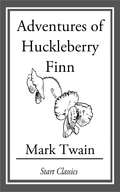- Table View
- List View
Adventures in the Screen Trade
by William GoldmanNow available as an ebook for the first time!No one knows the writer's Hollywood more intimately than William Goldman. Two-time Academy Award-winning screenwriter and the bestselling author of Marathon Man, Tinsel, Boys and Girls Together, and other novels, Goldman now takes you into Hollywood's inner sanctums...on and behind the scenes for Butch Cassidy and the Sundance Kid, All the President's Men, and other films...into the plush offices of Hollywood producers...into the working lives of acting greats such as Redford, Olivier, Newman, and Hoffman...and into his own professional experiences and creative thought processes in the crafting of screenplays. You get a firsthand look at why and how films get made and what elements make a good screenplay. Says columnist Liz Smith, "You'll be fascinated.
Adventures in the Skin Trade
by Dylan ThomasA story collection full of a fantastic and whimsical assortment of odd characters only Dylan Thomas could have conceived. This collection of the poet Dylan Thomas's fiction--and what an extraordinary storyteller he was!--holds special interest because it ranges from the early stories such as "The School for Witches" and "The Burning Baby," with their powerful inheritance of Welsh mythology and wild imagination, to the chapters he completed before his death of the alas unfinished novel Adventures in the Skin Trade. Adventures is the story, written in a shrewd, sly, deadpan vein of picaresque comedy, of young Samuel Bennet, who runs away from his home in Wales to seek his fortune in London.
Adventures in the Skin Trade and Other Stories
by Dylan Thomas21 short stories by Dylan Thomas, one of the major figures of 20th century literature.
Adventures in the Sky (Find Me!)
by Agnese BaruzziHave a howling good time with Bernard the Wolf as he takes to the skies—and space—with this delightful collection of seek-and-find puzzles. Bernard the Wolf is back in another thrilling seek-and-find adventure! This time, he&’s flying high up in the sky with the help of his new friend, Enrico the Robin, who&’s teaching him how to sharpen his vision. Filled with charming visual puzzles that take place in outer space, among colorful hot air balloons, inside a flock of flamingos, and more, children will have tons of fun while they develop their observation skills and practice drawing conclusions based on what they see with more than a hundred hidden object games! From determining which bird is pretending to be a wizard and which alien has a cold to what seems out of place and who is the lazy acrobat, Find Me! Adventures in the Sky is sure to entertain for hours on end! &“Find Me! seek-and-find books are a brilliant way to encourage critical thinking skills for your little one.&” —First Time Parent Magazine This is a fixed-format ebook, which preserves the design and layout of the original print book
Adventures in the South, Volume 4: Depart Switzerland
by Jacques CasanovaThis book is the number 4 of the "Adventures in the South"
Adventures in the South, Volume 4e: Milan
by Jacques CasanovaAdventures in the South, book 4e "Milan"
Adventures in the West: Henry Halpin, Fur Trader and Indian Agent
by David R. ElliottThis is the story of Irish-born Henry Ross Halpin, who by the age of 16 began a long association with the fur trade and Canada’s native peoples, was thrice employed by the Hudson’s Bay Company, and became an Indian agent (18851901). Halpin’s work took him from Fort Garry, Manitoba, to Fort York on the shores of the Hudson Bay, and across the Prairies to British Columbia. This book is based on Halpin’s previously unpublished menoirs, Hudson’s Bay Company post journals and correspondence, the 1885 Rebellion trials where Halpin was a witness, and the reports and correspondence of the Department of Indian Affairs.
Adventures in the Wilderness: Or, Camp Life in the Adirondacks
by W. H.H. MurrayKnown as the &“Father of the Outdoor Movement,&” William HH Murray&’s writings have been appreciated by generations of readers looking to nature as an escape from our daily lives as well as a portal to our past, perhaps none more so than his classic Adventures in the Wilderness: Or, Camp-Life in the Adirondacks. Published in 1869 and widely hailed as the first book on recreational camping ever published in America, this groundbreaking resource informed readers how to live in the woods: what equipment to bring, where to set up camp, how to cook, fish, and hunt, and most importantly insights on the profound connections to be made between humankind and the outdoor world around us. Besides introducing readers to the great outdoors, the book would go on to lay the foundation for the conservation movement. With a Foreword by Laura Rice, the Chief Curator of the Adirondack Experience Museum, this edition of Adventures in the Wilderness revisits Murray&’s timeless tips and stories of north country camping with modern-day context and clarity, showing that the profound power of nature has only grown.
Adventures into the Unknown Archives Volume 1
by VariousThe first ongoing horror comics anthology, Adventures into the Unknown! is finally collected into a series of deluxe hardcovers! The pre-Code delights found in this debut volume include inventive, exciting tales like "The Living Ghost," "Kill, Puppets, Kill," "The Affair of Room 1313," and the ongoing "True Ghosts of History" feature—and contributions from Golden Age greats Fred Guardineer, Al Feldstein, Leonard Starr, Edvard Moritz, and others! Adventures into the Unknown! Archives Volume 1 reprints the first four issues of the popular, long-running horror anthology, which ran from 1948 to 1967.* Foreword by Bruce Jones!
Adventures into the Unknown Archives Volume 2
by VariousCursed phantoms and enraged apparitions haunt the pages ofAdventures into the Unknown!—the first ongoing comics anthology of supernatural horror! Dark Horse&’s deluxe hardcover collects issues #5-#8 of this strange series. Featuring Golden Age talents like Jon L. Blummer, Tarzan newspaper strip illustrators Bob Lubbers and John Celardo, and horror legend Johnny Craig.* Foreword by horror writer Bruce Jones!
Adventures into the Unknown Archives Volume 3
by VariousFrom storm-battered castles to secret laboratories, the golden age supernatural anthology Adventures into the Unknown! had every spooky setting audiences could desire! Eminent illustrators Ogden Whitney, Bob Lubbers, John Celardo, Lin Streeter, and others deliver some classic pre-Code horror stories. Collecting issues #9-#12, this deluxe hardcover also includes an introductory essay by Michael T. Gilbert.* The rare and expensive comics are finally collected!* Featuring classic work by Ogden Whitney!
Adventures into the Unknown Archives Volume 4
by VariousFrom storm-battered castles to secret laboratories to the oceans' depths, the golden age supernatural anthology comic Adventures Into the Unknown had every spooky setting audiences could desire and Dark Horse is collecting them all into deluxe hardcover archive editions! A classic cover by Ogden Whitney sets the tone for our fourth excursion into the quirky realms found in Adventures into the Unknown! Enjoy "Beware the Jabberwock," "The Ghost that Didn't Die," and an excellent cover run by Whitney--as well as a plethora twisted tales! Classic monsters, convoluted crises, and ghosts of all sorts populate these entertaining stories from the early 1950s, with contributors including Fred Guardineer, Lin Streeter, Charles Sultan, and others. This volume features a new foreword by comic-book historian and Mr. Monster creator Michael T. Gilbert, as well as all original text pieces and letter columns!
Adventures of A Psychic: The Fascinating And Inspiring True-life Story Of One Of America's Most Successful Clairvoyants (Signet Ser.)
by Sylvia Browne Antoinette MayIn this uniquely fascinating book, world-renowned psychic Sylvia Browne recounts her captivating life as a clairvoyant, telling of her earliest "readings" as a young child in Kansas City, and of her first contact with "Francine," her spirit guide. In engrossing detail, Sylvia tells how her "gift" has assisted police departments in their search for missing children and dangerous criminals—and how her predictions of deaths, plane crashes, and momentous world events were sometimes heeded—or tragically ignored. But more than anything else, this is the remarkable story of one woman’s psychic odyssey, for it offers illuminating insight into how we can better understand ourselves and our own psychic abilities. ADVENTURES OF A PSYCHIC may give you an entirely new outlook on life, death, psychic phenomena, and the "other side!"
Adventures of Bindle: Revised Edition Of Original Version (Classics To Go)
by Herbert George JenkinsHerbert George Jenkins (1876 – 8 June 1923) was a British writer and the owner of the publishing company Herbert Jenkins Ltd. which published many of P. G. Wodehouse's novels. As was the norm at the time, many of his fictional works appeared first in pulp magazines. Two of his novels and several of his short stories were made into short movies. (Excerpt from Wikipedia)
Adventures of Don Quixote (Amplify Core Knowledge Language Arts Activity Book)
by Amplify LearningUnit 4 is centered around an adapted version of Don Quixote paired with Miguel de Cervantes's Adventures of Don Quixote.
Adventures of Don Quixote (Dover Children's Thrift Classics)
by Argentina Palacios"Once, there was a man who went crazy from too much reading. He only read books about knighthood; that was the problem." So begins this charming retelling of Don Quixote de la Mancha, one of the most entertaining books ever written. Young people will delight in the hilarious adventures of the idealistic would-be knight and his "squire," Sancho Panza, as they set out to right the wrongs of the world. Ms. Palacios, a talented storyteller, captures all the flavor and irony of the original as the two heroes ride forth to conquer evil. Along the way the well-meaning but addled knight-errand mistakes a miserable inn and its keeper for a castle and its lord; imagines an ordinary peasant girl to be the noble lady Dulcinea, perceives windmills as giants to be overcome, and gets enmeshed in other cases of mistaken identity. These, and many more incidents and adventures are retold here in a beguiling, easy-to-read version, enhanced by six new black-and-white illustrations by Thea Kliros. This edition is sure to delight today's youngsters, just as the original has enchanted countless readers since its publication nearly 400 years ago.
Adventures of Don Quixote: Activity Book (Amplify Core Knowledge Language Arts, Grade 5 #Unit 4)
by Amplify EducationNIMAC-sourced textbook
Adventures of Don Quixote: New Edition, With Engravings From Designs By Richard Westall, Volume 2
by Miguel de Cervantes Saavedra Argentina PalaciosNIMAC-sourced textbook
Adventures of Don Quixote: Translated From The Spanish (classic Reprint) (Dover Children's Thrift Classics Ser.)
by Miguel de Cervantes Saavedra Argentina Palacios"Once, there was a man who went crazy from too much reading. He only read books about knighthood; that was the problem." <P><P>So begins this charming retelling of Don Quixote de la Mancha, one of the most entertaining books ever written. Young people will delight in the hilarious adventures of the idealistic would-be knight and his "squire," Sancho Panza, as they set out to right the wrongs of the world. <P><P>Ms. Palacios, a talented storyteller, captures all the flavor and irony of the original as the two heroes ride forth to conquer evil. Along the way the well-meaning but addled knight-errand mistakes a miserable inn and its keeper for a castle and its lord; imagines an ordinary peasant girl to be the noble lady Dulcinea, perceives windmills as giants to be overcome, and gets enmeshed in other cases of mistaken identity. These, and many more incidents and adventures are retold here in a beguiling, easy-to-read version, enhanced by six new black-and-white illustrations by Thea Kliros. <P><P>This edition is sure to delight today's youngsters, just as the original has enchanted countless readers since its publication nearly 400 years ago.
Adventures of Dr. McNinja, The: King Radical
by Christopher HastingsWhen everyone thinks Dr. McNinja is killed by a vengeful astronaut ghost, it's his chance to infiltrate the criminal organization of King Radical. But should he who fights rad monsters beware of becoming one himself?
Adventures of Homer Fink
by Paul Galdone Sidney OffitHomer Fink could speak Latin and Greek or chart the orbit of the planet Jupiter, but when it came to tying his shoelaces or knotting his tie Homer was helpless. The Adventures of Homer Fink is a story of youth's first awareness of power and philosophy and love. It is peopled with characters as real as your next-door neighbors and yet uniquely extraordinary. Above all, this is a tale full of humor and affection and the wonder of growing up.
Adventures of Huckleberry Finn
by Mark Twain E. W. KembleReferring to Adventures of Huckleberry Finn, H. L. Mencken noted that his discovery of this classic American novel was "the most stupendous event of my whole life"; Ernest Hemingway declared that "all modern American literature stems from this one book," while T. S. Eliot called Huck "one of the permanent symbolic figures of fiction, not unworthy to take a place with Ulysses, Faust, Don Quixote, Don Juan, Hamlet."The novel's preeminence derives from its wonderfully imaginative re-creation of boyhood adventures along the mighty Mississippi River, its inspired characterization, the author's remarkable ear for dialogue, and the book's understated development of serious underlying themes: "natural" man versus "civilized" society, the evils of slavery, the innate value and dignity of human beings, the stultifying effects of convention, and other topics. But most of all, Adventures of Huckleberry Finn is a wonderful story ― filled with high adventure and unforgettable characters (including the great river itself) ― that no one who has read it will ever forget.
Adventures of Huckleberry Finn
by Mark Twain Jayne Anne Phillips Padgett PowellThe adventure of a lifetime Tom Sawyeras pal Huck Finn finds himself on the run, floating down the Mississippi with Jim, a runaway slave. With rich description as well as sharp satire, Twain vividly recreates the world he knew as a child.
Adventures of Huckleberry Finn
by Mark TwainClimb aboard the raft with Huck and Jim and drift away from the "sivilized" life and into a world of adventure, excitement, danger, and self-discovery. Huck's shrewd and humorous narrative is complemented by lyrical descriptions of the Mississippi valley and a sparkling cast of memorable characters.
